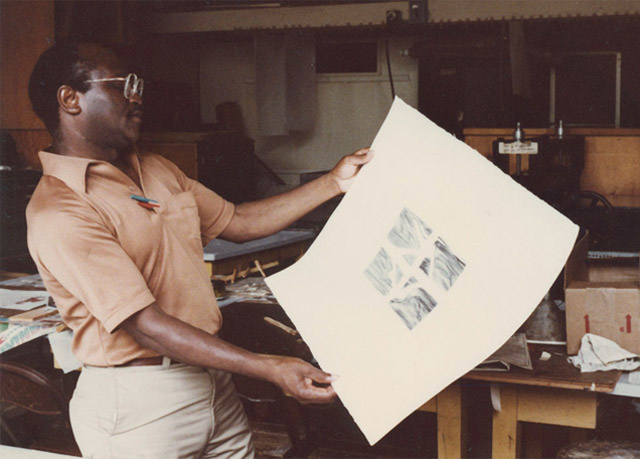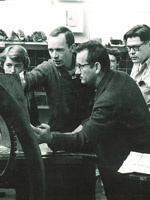
Leon Hicks learned to see at the University of Iowa.
After graduating from Kansas State University in 1959, the Florida native came to Iowa City—eyesight intact—to further his education as a painter. Then he met former UI printmaking chair Mauricio Lasansky, and his perspective on art was forever altered.
“Lasansky was the master of manipulating the elements of art,” says Hicks, who took a required printmaking course from Lasansky. “He would say, ‘Leon, move that form across the page there’ or ‘The image is asleep—you need to wake it up.’ Under his direction, I stopped imitating appearance and became aware of the surface I was working on and communicating a certain sensibility to the viewer.”
Mauricio Lasansky

• Recognized as one of the fathers of 20th-century American printmaking
• Joined UI art faculty in 1945 and retired in 1986
• Best known for his 1966 art project, The Nazi Drawings, a privately owned collection of 33 drawings on loan to the UI Museum of Art (the work has been in storage since the museum was damaged by 2008 flooding)
• Died in 2012 at age 97 in Iowa City
A five-time Guggenheim Fellow from Argentina, Lasansky joined the UI art faculty in 1945 and taught intaglio printmaking—what he described as the combination of drawing, painting, and sculpture. He established at Iowa the nation’s first Master of Fine Arts printmaking program and brought it to international prominence; it has been a top-ranked program ever since. He saw potential in the young Hicks, who admits he knew very little about the art form at the time, and soon invited Hicks to study with him.
“Lasansky could determine, based on your drawings, whether you’d be a good printmaking student. I knew he was famous and here he was telling me to be a printmaker, and I said, ‘I’ll think about it.’ Luckily, I had the good fortune and the good Southern sense to accept the invitation,” Hicks recalls. “He invented me.”
Hicks learned Lasansky’s method, which involves drawing, the printing press, multiple plates, homemade ink, and acid washes to create images that pop off the paper. But he says he left Iowa with much more.
“Lasansky taught us to observe, to ‘see’ what our pictures were saying to us, and he informed our capacity to understand what we were seeing,” he says. “Lasansky also made me an artist who could teach art. I gained from him a purposeful agenda in understanding where art came from and what the human mind is capable of generating from that knowledge. He was not an intellectual. He was a genius artist, and he found a way to teach that. At Iowa, I built the raw foundation for what I would become.”
Hicks lauds the UI not only for hiring Lasansky but also for building a strong faculty at the School of Art and Art History in the College of Liberal Arts and Sciences.
“Byron Burford, Mauricio Lasansky, James Lechay. These were big-time practitioners—and they were our teachers,” says Hicks, who earned a Master of Arts in 1961 and a Master of Fine Arts in 1963. “Iowa became a Mecca for modern art.”
Hicks retired in 1999 after teaching at a number of institutions, including Florida A&M University, Concord College, Lincoln University, Lehigh University, and Webster University. His work belongs in the collections of the University of Florida, the 7UP Company, the Oakland Art Museum, Atlanta University, Southwestern Bell Corporation, the Charleston Art Gallery, Tuskegee Institute, Brandywine Graphic Workshop, Albrecht Art Museum, and the Library of Congress.
He now lives in Tallahassee, Florida.
Was there a University of Iowa faculty or staff member who had a deep impact on your life and career? If so, we’d love to hear your story! Contact Sara Moninger at alumni-edition@uiowa.edu or 319-384-0045.